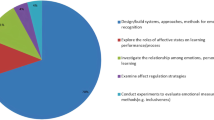Abstract
In the last year, schools, universities, teachers, and students had to adapt to distance learning because of the pandemic situation. The e-learning situation is very different from a face-to-face situation. One of the problems of the e-learning is that the students should be more responsible to not distracted. Another problem is that the type of computer for each student varies significantly. Finally, the traditional interaction between teacher, student and content is made more complicated by introducing technology. When new tools are applied, and there is an improvement in e-learning education, student, teacher, and educational institutions benefit from it. Emotion plays an essential role in the knowledge, acquisition, and decision process of an individual. There is also significant evidence that rational learning in humans is dependent on emotions. In this paper, we presented a solution with an Intelligent Tutor Application, that analyzed emotions in a non-intrusive and non-invasive way.
Access this chapter
Tax calculation will be finalised at checkout
Purchases are for personal use only
Similar content being viewed by others
References
Rodrigues, M., Novais, P., Santos, M.F.: Future challenges in intelligent tutoring systems: a framework (2005)
Carneiro, D., Pimenta, A., Gonçalves, S., Neves, J., Novais, P.: Monitoring and improving performance in human–computer interaction. Concurrency Comput.: Pract. Experience 28(4), 1291–1309 (2016)
Carneiro, D., Novais, P., Durães, D., Pego, J.M., Sousa, N.: Predicting completion time in high-stakes exams. Futur. Gener. Comput. Syst. 92, 549–559 (2019)
Durães, D., Toala, R., Gonçalves, F., Novais, P.: Intelligent tutoring system to improve learning outcomes. AI Commun. 32(3), 161–174 (2019)
Brusilovsky, P.: From adaptive hypermedia to the adaptive web (invited talk). In: Proceedings of Mensch Computer, pp. 21–24 (2003)
Rincon, J.A., Julian, V., Carrascosa, C., Costa, A., Novais, P.: Detecting emotions through non-invasive wearables. Logic J. IGPL 26(6), 605–617 (2018)
Ortony, A., Clore, G.L., Collins, A.: The Cognitive Structure of Emotions. Cambridge University Press, Cambridge (1990)
Hasan, M.A., Noor, N.F.M., Rahman, S.S.A., Rahman, M.M.: The transition from intelligent to affective tutoring system: a review and open Issues. IEEE Access 8, 204612–204638 (2020)
Hooshyar, D., Ahmad, R.B., Yousefi, M., Fathi, M., Horng, S.J., Lim, H.: Applying an online game-based formative assessment in a flowchart-based intelligent tutoring system for improving problem-solving skills. Comput. Educ. 94, 18–36 (2016)
Petrovica, S., Anohina-Naumeca, A., Ekenel, H.K.: Emotion recognition in affective tutoring systems: collection of ground-truth data. Proc. Comput. Sci. 104, 437–444 (2017)
Ramírez-Noriega, A., Juárez-Ramírez, R., Martínez-Ramírez, Y.: Evaluation module based on Bayesian networks to intelligent tutoring systems. Int. J. Inf. Manage. 37(1), 1488–1498 (2017)
Victorio-Meza, H., Mejía-Lavalle, M., Ortiz, G.R.: Advances on knowledge representation of intelligent tutoring systems. In: 2014 International Conference on Mechatronics, Electronics and Automotive Engineering (ICMEAE), pp. 212–216. IEEE Computer Society, November 2014
Durães, D., Jiménez, A., Bajo, J., Novais, P.: Monitoring level attention approach in learning activities. In: Methodologies and Intelligent Systems for Technology Enhanced Learning, pp. 33–40. Springer, Cham (2016)
Durães, D., Carneiro, D., Jiménez, A., Novais, P.: Characterizing attentive behavior in intelligent environments. Neurocomputing 272, 46–54 (2018)
Hassin, M.H.M., Aziz, A.A., Norwawi, N.M.: Affective computing: knowing how you feel. In: The National Seminar of Science Technology and Social Science (STSS 2004), UiTM Pahang (2004)
Picard, R.W.: Affective computing for HCI. In: HCI, no. 1, pp. 829–833, August 1999
Picard, R.W., Papert, S., Bender, W., Blumberg, B., Breazeal, C., Cavallo, D., Strohecker, C.: Affective learning—a manifesto. BT Technol. J. 22(4), 253–269 (2004)
Acknowledgement
This work has been supported by FCT - Fundação para a Ciência e Tecnologia within the R&D Units Project Scope: UIDB/00319/2020.
Author information
Authors and Affiliations
Corresponding author
Editor information
Editors and Affiliations
Rights and permissions
Copyright information
© 2021 The Author(s), under exclusive license to Springer Nature Switzerland AG
About this paper
Cite this paper
Toala, R., Durães, D., Novais, P. (2021). Emotions and Intelligent Tutors. In: Rocha, Á., Adeli, H., Dzemyda, G., Moreira, F., Ramalho Correia, A.M. (eds) Trends and Applications in Information Systems and Technologies. WorldCIST 2021. Advances in Intelligent Systems and Computing, vol 1365. Springer, Cham. https://doi.org/10.1007/978-3-030-72657-7_47
Download citation
DOI: https://doi.org/10.1007/978-3-030-72657-7_47
Published:
Publisher Name: Springer, Cham
Print ISBN: 978-3-030-72656-0
Online ISBN: 978-3-030-72657-7
eBook Packages: Intelligent Technologies and RoboticsIntelligent Technologies and Robotics (R0)




